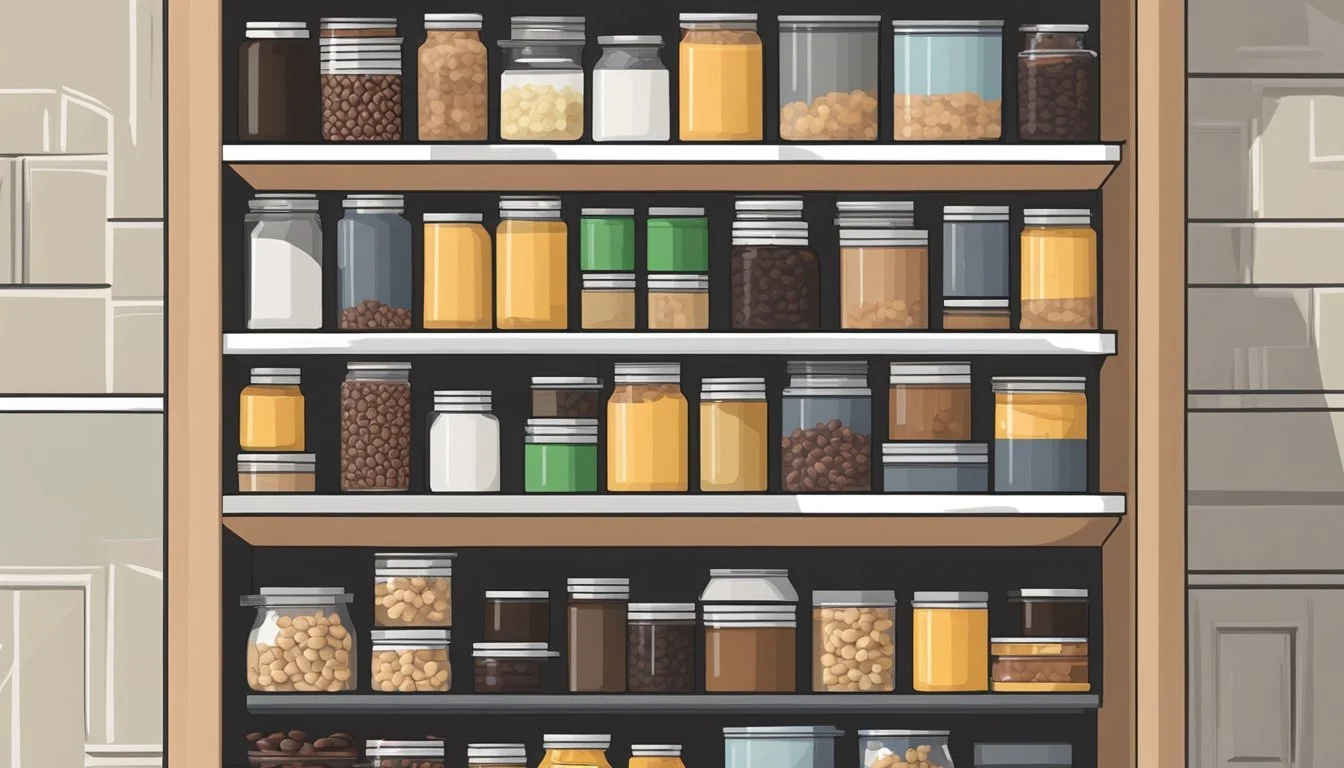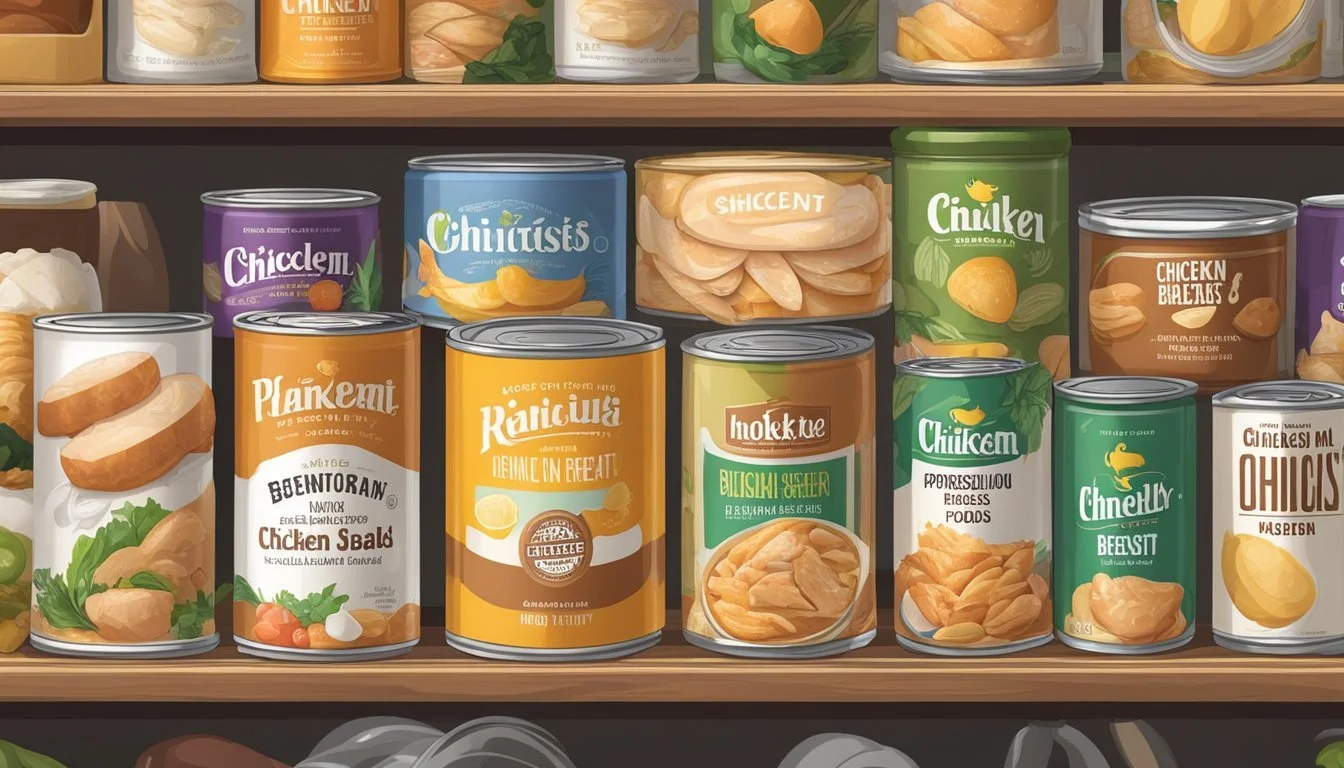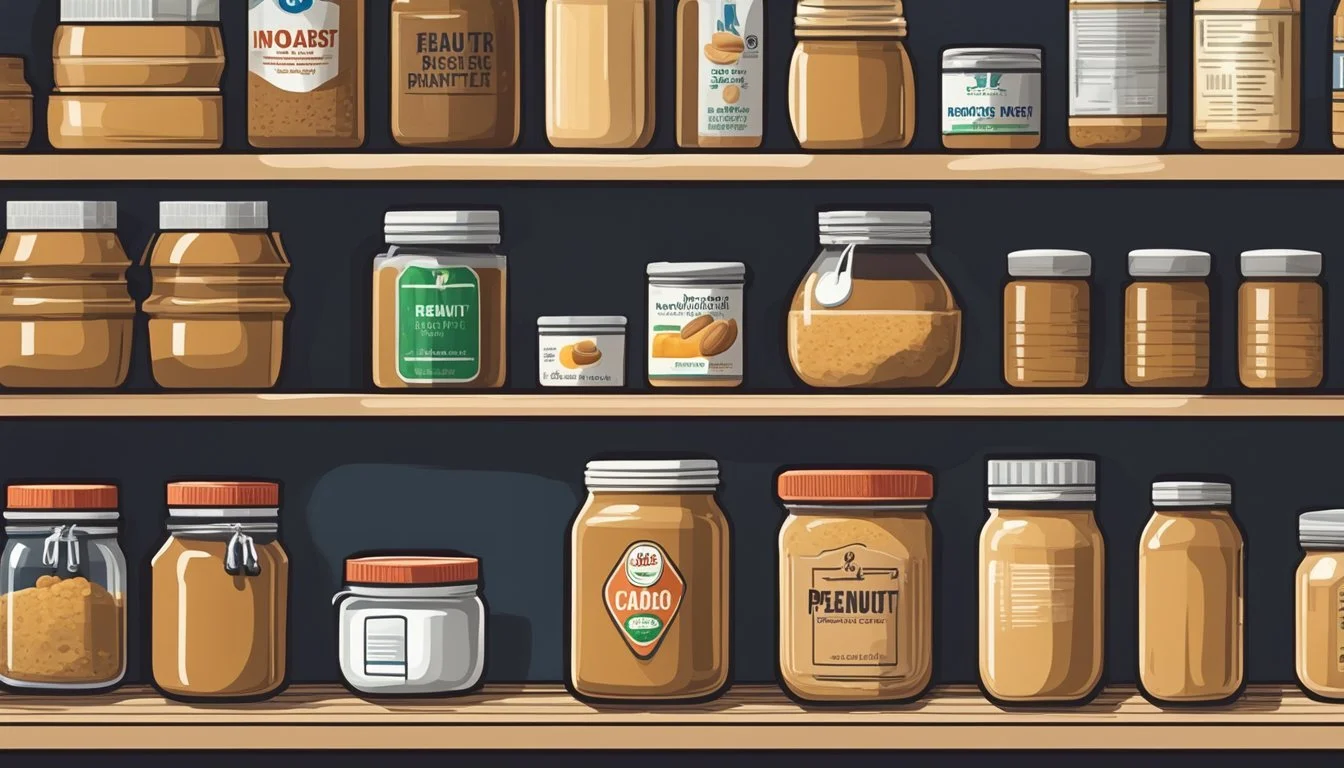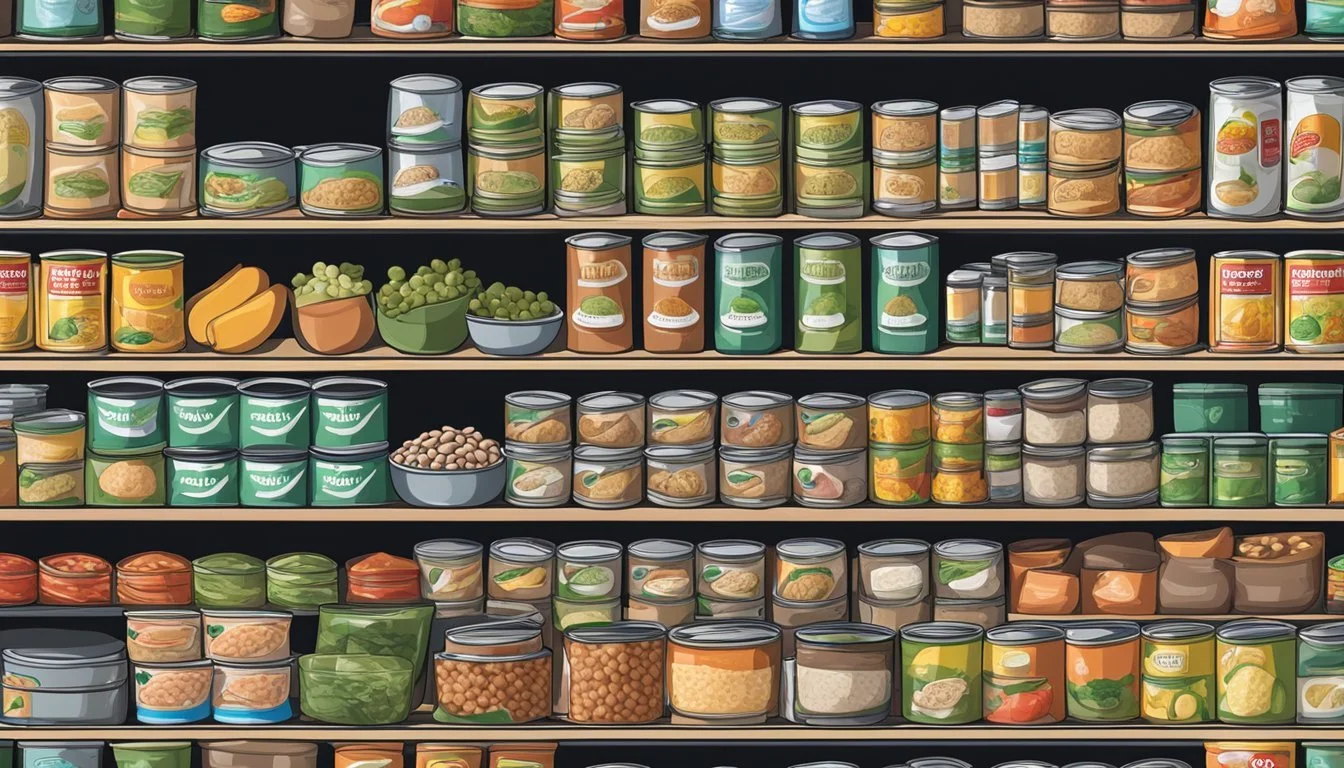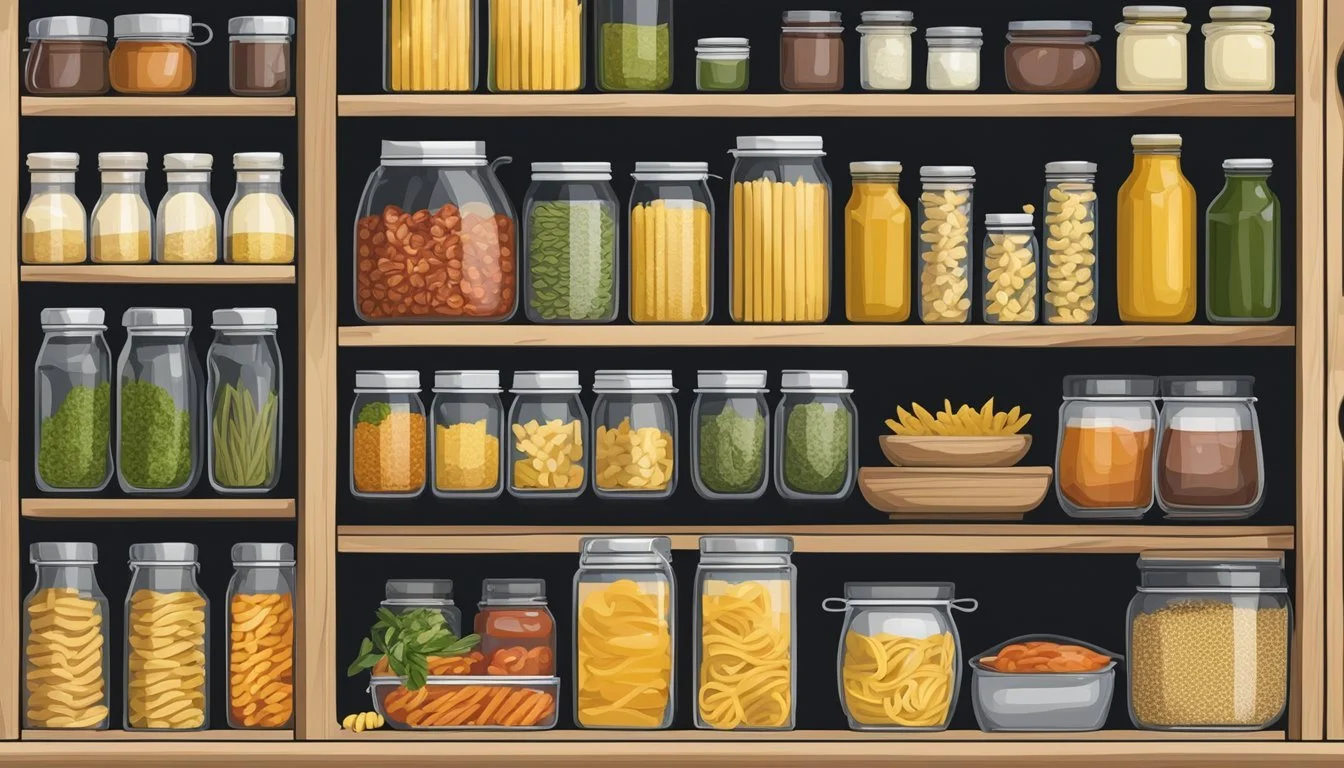Top Essential Foods for Stocking Your Emergency Shelf-Stable Pantry
Must-Have Items for Preparedness
The importance of having a well-prepared emergency pantry cannot be overstated. In times of crisis or unforeseen events, having a selection of essential shelf-stable foods can provide peace of mind and ensure the well-being of you and your family. A stocked emergency pantry that includes a variety of non-perishable items can sustain you during extended periods when fresh food might be unavailable.
Choosing the right foods for your emergency pantry involves selecting items that are nutritious, have a long shelf-life, and can be easily stored. This article will guide you through essential foods to consider, helping you create a pantry that is both practical and comprehensive, ensuring preparedness for any situation.
1) Canned Black Beans
Canned black beans are an excellent choice for an emergency pantry. They offer a rich source of protein and fiber, which are essential for maintaining energy levels and supporting digestion. In addition to their nutritional benefits, black beans are incredibly versatile and can be used in a variety of dishes.
One key advantage of canned black beans is their long shelf life. Stored properly, they can last for several years, making them a reliable staple for any emergency situation. They can be utilized in soups, stews, salads, or as a side dish.
Moreover, canned black beans require minimal preparation. They can be easily heated and eaten straight from the can or added to recipes with little effort. This convenience is crucial during emergencies when resources and time may be limited.
Nutritionally dense and easy to store, canned black beans are a vital component of a well-rounded emergency food supply. They not only provide essential nutrients but also add variety and flavor to your meals.
2) Dried Lentils
Dried lentils are a crucial addition to any emergency pantry. They are highly nutritious, providing a good source of protein, fiber, iron, and essential vitamins. Lentils come in various types, such as green, red, brown, and black, each having a slightly different cooking time and texture.
Lentils have a long shelf life when stored properly. Keep them in a cool, dry area in an airtight container. This helps prevent moisture and pests from compromising their quality. Properly stored, dried lentils can last for up to a year or more.
Cooking dried lentils is straightforward and does not require soaking, unlike many other legumes. They can be prepared quickly, usually in 15-30 minutes, making them an ideal choice for quick meals. They are perfect for soups, stews, salads, and as a base for various dishes.
Given their nutritional value, versatility, and ease of preparation, dried lentils are an indispensable item for any well-stocked emergency pantry. They provide lasting energy and essential nutrients during times of need.
3) Canned Chicken Breast
Canned chicken breast is a versatile and nutritious option for any emergency pantry. It serves as a reliable source of protein, essential for muscle repair and energy. Packaged in a durable tin, it has a long shelf life, making it suitable for long-term storage.
It can be used in numerous recipes, including soups, salads, sandwiches, and casseroles. This adaptability ensures that meals remain interesting and varied even during emergencies. The chicken is pre-cooked, saving valuable time and resources when meal preparation is a concern.
Nutritionally, canned chicken breast provides vital nutrients such as B vitamins and minerals like phosphorus and selenium. These contribute to maintaining overall health and well-being during stressful situations. Since it's a low-fat meat option, it fits well into different diet plans.
Finding canned chicken breast is easy, as it is available in most grocery stores. Additionally, it's often cost-effective, allowing for bulk purchases without breaking the budget. For those looking to maintain a reliable and nutritious food supply, canned chicken breast is an excellent choice.
4) Instant Oatmeal
Instant oatmeal is a practical and nutritious choice for any emergency shelf-stable pantry. It requires minimal preparation, typically just hot water, making it a convenient option during emergencies when resources may be limited.
Oatmeal is rich in fiber, which helps to maintain a healthy digestive system. It also provides essential vitamins and minerals such as iron and magnesium. These nutrients are crucial for maintaining energy levels and overall health during stressful situations.
Moreover, instant oatmeal has a long shelf life, often lasting up to two years if stored properly. Keeping it in a cool, dry place in an airtight container can help extend its longevity.
Instant oatmeal is also versatile. It can be customized with a variety of toppings like dried fruits, nuts, or honey, depending on personal preferences and availability. This makes it not only a nutritious meal but also a comforting one in times of need.
5) Peanut Butter
Peanut butter is a valuable addition to any emergency food stockpile. It has a long shelf life, typically lasting up to two years when unopened. This makes it a reliable source of nutrition over an extended period.
Rich in protein, healthy fats, and essential vitamins, peanut butter provides sustained energy. It supports muscle function and overall health, making it a versatile nutrient source.
Peanut butter is convenient because it doesn't require refrigeration after opening. It can be used in various meals and snacks, adding flavor and nutrition with minimal preparation.
Additionally, peanut butter accommodates various dietary preferences. It's available in different varieties, including creamy, crunchy, and natural options, making it easy to find a kind that suits individual tastes.
6) Shelf-Stable Milk
Shelf-stable milk is an essential item for any emergency pantry. Unlike regular milk, it does not require refrigeration until opened.
Shelf-stable milk retains its nutrients and taste for months. This makes it a reliable source of calcium and vitamin D during emergencies.
There are various types available, including cow's milk, almond milk, and soy milk. Each option caters to different dietary needs.
Shelf-stable milk comes in convenient packaging such as cartons or bottles. This ensures minimal space usage and easy storage.
It's often fortified with additional vitamins and minerals. This enhances its nutritional value, providing more than just basic sustenance.
When stocking shelf-stable milk, check expiration dates regularly to ensure freshness. Rotate your stock to use the oldest products first.
7) Canned Tuna
Canned tuna is a highly recommended item for any emergency stockpile. It offers a substantial amount of protein, which is essential for maintaining energy levels and supporting muscle repair during critical situations.
Another advantage of canned tuna is its long shelf life. Most varieties can last at least two years when stored properly, providing reliable sustenance over extended periods.
The omega-3 fatty acids present in tuna contribute to cardiovascular health, making it not just a convenient food item but also beneficial for maintaining overall well-being.
Canned tuna is versatile in meal preparation. It can be added to salads, mixed with pasta, or simply eaten straight from the can, offering various options without the need for extensive cooking.
8) Pasta
Pasta is a versatile and essential item for any emergency shelf-stable pantry. It serves as a foundational ingredient that can be paired with various other pantry staples like canned vegetables, meats, and sauces.
Both dry and instant pasta have an extended shelf life, making them practical choices.
Long varieties, such as spaghetti and fettuccine, as well as shorter options like penne and macaroni, can be stored easily in airtight containers.
Pasta is quick to cook, typically requiring only boiling water and a few minutes of preparation time. This makes it an efficient option during emergencies where time and resources might be limited.
Whole-grain pasta is available for those seeking higher fiber and nutrient content.
Instant pasta products, like mac and cheese, can also be useful for quick meals. They often come with a powdered cheese packet, requiring only water and minimal cooking time.
Including a variety of pasta types ensures meal diversity and can accommodate different dietary preferences.
Incorporating pasta into your emergency food supply can provide comfort and sustenance during uncertain times.
9) Rice
Rice is an essential staple for any emergency pantry. Its long shelf life, versatility, and ease of storage make it a reliable food option during emergencies.
Available in various types such as white, brown, and wild, rice can be used in countless recipes. It pairs well with beans, vegetables, and canned meats, creating well-rounded meals.
White rice has a shelf life of up to 30 years if stored properly. Brown rice is more nutritious but has a shorter shelf life due to its higher oil content.
Rice is relatively inexpensive and can be purchased in bulk. It's crucial to store it in a cool, dry place, preferably in airtight containers to prevent spoilage and infestation.
10) Canned Diced Tomatoes
Canned diced tomatoes are a valuable addition to any emergency pantry. They are versatile and can be used in a variety of dishes, including soups, stews, and pastas. Their acidity and nutrient content contribute to a balanced diet, providing essential vitamins like vitamin C and lycopene, which is an antioxidant.
The preservation process of canning ensures a long shelf life, making them a reliable option for extended storage. Canned tomatoes are often packed at peak ripeness, maintaining their flavor and nutritional value. They also require minimal preparation, making them convenient for quick meal preparation during emergencies.
Canned diced tomatoes can enhance the taste of various recipes, adding a fresh, tangy element. They pair well with other canned foods, such as beans and meats, to create hearty and nutritious meals. The compact packaging also makes them easy to store in any pantry space.
Benefits of a Shelf-Stable Pantry
Keeping a well-stocked shelf-stable pantry offers numerous advantages, particularly in terms of food longevity, preparedness for emergencies, and financial savings. These benefits ensure that nutritious and versatile food options remain available when they are most needed.
Longer Shelf Life
Shelf-stable foods are designed to last for extended periods without refrigeration. This longevity is crucial for reducing food waste and ensuring a steady supply of essential nutrients.
Examples:
Canned Goods: Items like beans, fruits, and vegetables can last for years.
Dry Foods: Grains, pasta, and legumes remain usable for long durations if stored correctly.
Packed Products: Vacuum-sealed or professionally dried foods offer even longer shelf lives.
Convenience During Emergencies
In times of natural disasters, unexpected power outages, or other emergencies, having a stockpile of shelf-stable foods can be life-saving.
Benefits:
Instant Access: Immediate access to nutritious food without the need for cooking or refrigeration.
Versatile Use: These foods provide a wide range of meal options, from ready-to-eat canned goods to dry foods that can be prepared with minimal water and heat.
Stress Reduction: Ensures peace of mind by knowing that there is always food available, regardless of external circumstances.
Cost-Effectiveness
Shelf-stable foods are generally more budget-friendly and can be purchased in bulk, which reduces overall shopping frequency and expenses.
Financial Advantages:
Bulk Purchases: Buying in large quantities often comes with discounts.
Reduced Waste: Fewer spoilage issues mean less money spent replacing expired items.
Sales and Discounts: Identifying sales on canned or dry items allows for strategic purchasing, further lowering costs.
A well-rounded shelf-stable pantry can therefore be an indispensable part of any household, providing essential nutrition and security against unforeseen events while being financially prudent.
Nutritional Considerations for Emergency Foods
When stocking an emergency pantry, it is critical to focus on foods that provide essential nutrients, have high caloric density, and avoid empty calories. Prioritizing these factors ensures that your emergency supplies will sustain you effectively during crises.
Essential Nutrients
Prioritizing foods with essential nutrients is important for maintaining health during emergencies. Proteins such as canned tuna, chicken, or beans provide necessary amino acids for muscle repair and immune function. Vitamins and minerals from canned vegetables and fruits can help prevent deficiencies.
Whole grains like oats, quinoa, and brown rice offer fiber, which aids in digestive health. Multivitamins are also recommended, in case nutrient-rich foods are unavailable.
Electrolytes are crucial for hydration and cellular functions. Consider adding sports drinks or electrolyte powders to your supply.
Nutrient Sources Protein Canned meats, beans, lentils Vitamins & Minerals Canned vegetables, dried fruits Fiber Whole grains, brown rice, oats Electrolytes Sports drinks, electrolyte powders
Caloric Density
In situations where food may be scarce, opting for high-calorie foods ensures you get the energy needed to perform essential activities. Foods such as nuts, seeds, and dried fruits are calorie-dense and nutrient-rich.
Oils and fats like olive oil or nut butters not only provide high calories but also essential fatty acids required for brain health. Energy bars are convenient options that combine calories and nutrients, making them suitable for quick meals.
Food Category Examples Nuts & Seeds Almonds, sunflower seeds Oils & Fats Olive oil, peanut butter Energy Bars Protein bars, granola bars
Avoiding Empty Calories
Stocking up on nutritionally empty foods like sugary snacks and sodas should be minimized. These items provide calories but lack essential vitamins, minerals, and proteins. Processed foods with high sugar and salt content can lead to health issues if consumed long-term.
Focus on whole foods and minimally processed items to ensure a balanced intake. Avoiding substances that can negatively impact well-being, like excessive caffeine or alcohol, helps maintain better overall health during emergencies.
Empty Calories Alternatives Sugary Snacks Dried fruits, nuts Sodas Water, herbal teas Processed Snacks Whole grain crackers, trail mix


